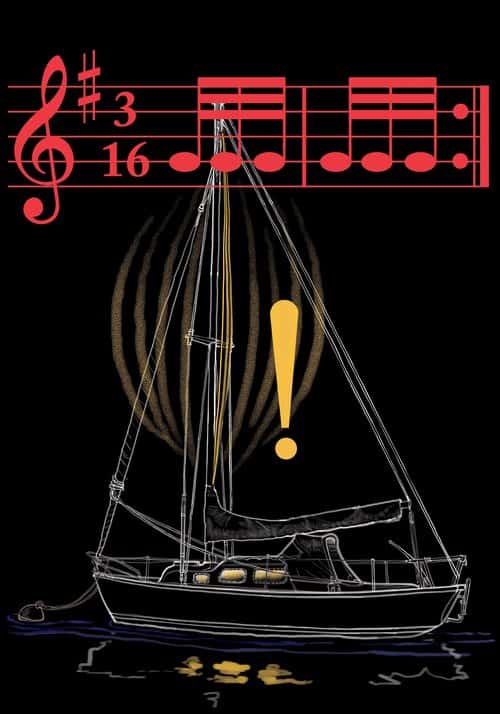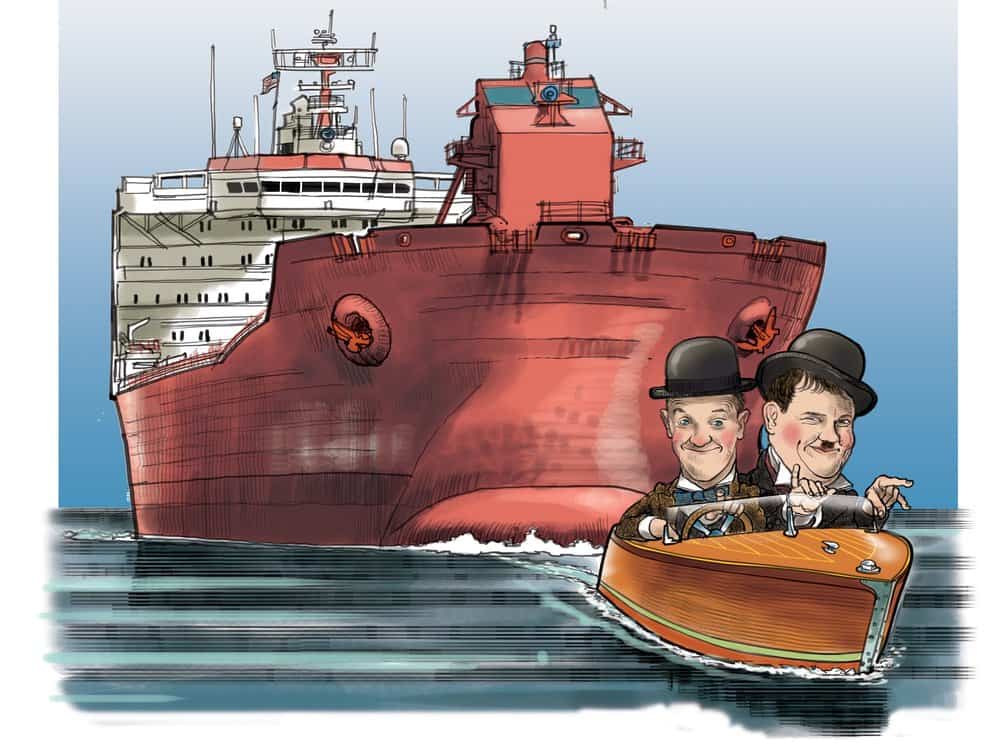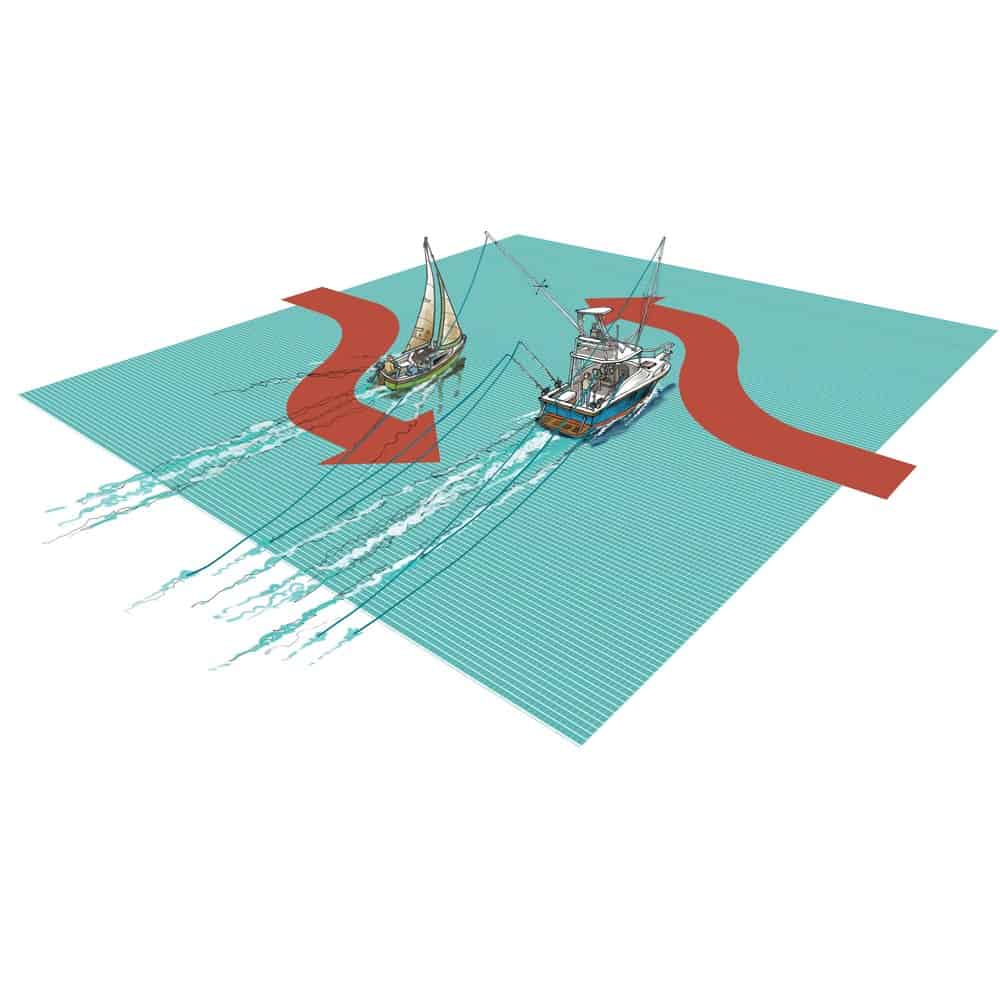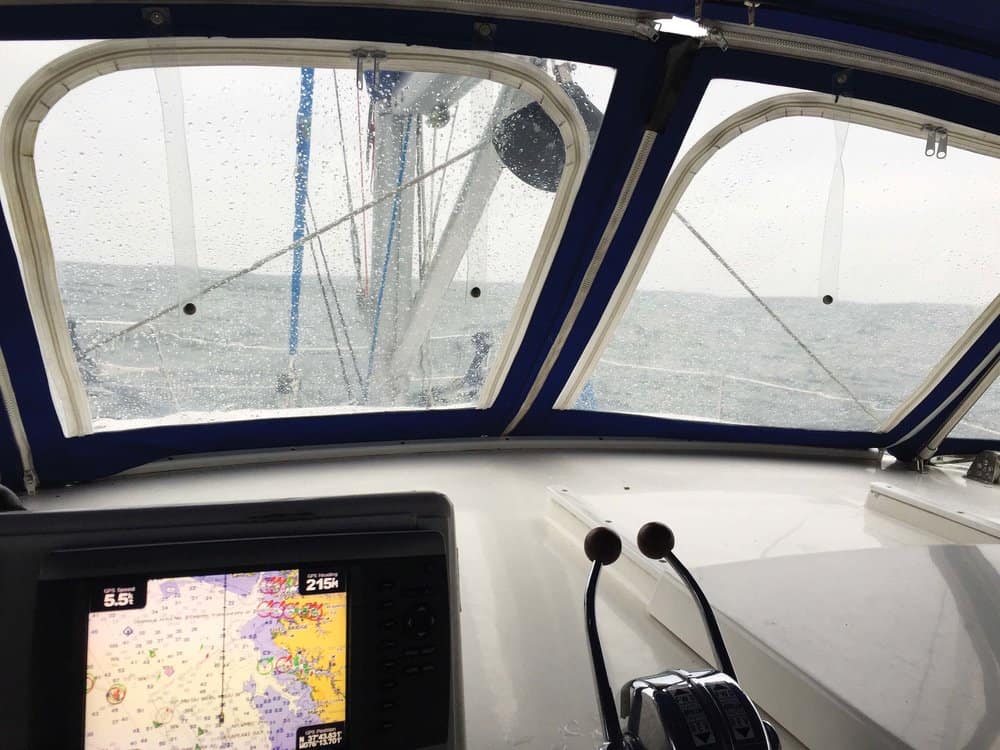All right, class, everyone sitting up straight, feet flat on the floor and eyes looking straight down at the page? Good. What? Yes, Rob, you can go fetch your reading glasses, but be quick about it. We have a lot to get to in a short article. Now, the rest of you, all set?
Stop! No one leave! I promise you this is not going to be painful. All the sentences will be short and there will be funny drawings. After all, this is the 21st century. You could practically put this on Instagram. The important thing for you to know, though, is that this is going to make your life on the water better and easier. That’s one of Capt. Jody’s favorite mottos she just made up: A civilized world is a happy world.
Okay, Rob has finally found his glasses, so let’s begin.
Be a Great Boat Guest
We are going to start off easy with rules that pertain to other people—guests you’ve invited out on your boat. So, invitees, listen up.
Rule 1—Don’t be late.
Being late for a cruise or day sail is wrong for a hundred reasons. Distance to be covered. The wind is going to die at noon. The current will turn against us at 2 p.m. The captain got to the boat at 5 a.m. to get everything ready and ran out of coffee at 6:30, but you didn’t arrive until 8. Uh-oh. You get the picture.
Rule 2—Bring snacks and drinks to share.
If you do arrive at 8, but bring with you hot coffee and doughnuts for everyone, plus sub sandwiches, chips and two six-packs of craft beer, you can be pretty sure the captain’s mood will brighten considerably. Arrive with all that at 6:30, and you may be made an honorary admiral.
Rule 3—Pack light and don’t bring a wheelie bag.
If you are coming onboard for a weekend or a week, bring only the essentials. Check the weather forecast for the route. (Ha-ha, just had to throw that in.) Check with the captain on social plans. (Dress flip-flops required?) And then pack it all in a flexible, stuffable bag, like a duffel or sail bag. Then take half the stuff out and put it back in your closet. Unless you are setting off on a Nordhavn or a houseboat, you are not going to have much room. (Capt. Jody’s tip: If you are setting off on a houseboat, unpack everything and stay home.)
Extra credit
Ask permission to come aboard.
Before you set foot on your host’s boat, say, “Permission to come aboard?” It might seem silly, but it’s tradition, and it’s good manners, like ringing the doorbell. See Capt. Jody’s motto above.
Be a Boss Captain
Time to turn the tables and look at the skipper’s responsibilities toward guests (in addition to not sinking off Hoopers Island, of course).
Rule 1—Share the trip.
Suggest clothes for the trip, including anticipated tiki bar tours or wine-tasting dinner at the Tides Inn, if applicable. Suggest food, drinks and personal snacks, as appropriate. You get the idea. Anything that will make your guests feel more comfortable. Don’t forget to bring up wheelie bags.
Rule 2—Share important information.
Before leaving the dock, explain to
your guests where to find the safety equipment, like life jackets and fire extinguishers. Slowly and carefully explain the fine art of using the head. Then slowly and carefully explain it again. Discuss the evils of long showers. If you are the only one familiar with your boat, explain to your guests how to stop the boat and call for help if you should suddenly become catatonic.
Rule 3—Set the stage.
Also, before you leave the dock, put your guests at ease by telling them where to sit or stand while you are pulling the boat out of the slip and getting underway. If they are keen to help, put them in the stern and hand them a boat hook. We all feel more Captain Ahab-ish holding a boat hook. And, who knows, you might be the better for a nudge off that pesky starboard outboard piling. Just don’t make it anything you can’t live without. Too much pressure on everyone.
Be a Good Mr. Rogers: At the Dock
Capt. Jody, you’ve written 700 words and we still haven’t left the dock! Patience, readers, you will thank me for this.

Rule 1—Sailors, silence your halyards!
Do whatever it takes, fellow sailors, but keep your halyards from banging against your mast. No one wants to lie awake listening to the clang, clang clang, clang, clang of your running rigging. Take a few bungies and hold the halyards away from the mast using the stays before your sleep-maddened neighbor plots to use your cranium for the purpose instead.
Rule 2—Keep your stuff off the dock.
I don’t have to explain this. Don’t leave your cooler, spare anchor, bicycle and two heirloom tomato plants on the dock in front of your boat. Return the dock cart. Tidy up your power cords. Enough said.
Rule 3—Lend a hand . . . or not.
Ask incoming boaters, particularly if they are transients, if they’d like a hand with their lines. Transients are the ones squinting to make out the slip numbers as they creep down the fairway. Hey, we’ve all been there! You can ask your fellow dockmates, too, if they’d like you to catch a line, but usually they have a developed a system for getting into their slip and firmly believe that any alteration in it will disturb the delicate balance between a successful landing and holy-cow disaster. In other words, don’t be offended if they say
no thanks.

Be a Jolly Mr. Rogers: At Anchor
Yes, we’re on the water at last. But before we get to the general coming and going of life on the water, let’s pause for a moment on anchoring, because it has a lot in common with life on the docks, but without finger piers.
Rule 1—Weigh your options.
It is the height of bad manners to anchor too close to a boat already on the hook. So, before you drop your shiny new Rocna or trusty old Danforth, make sure everyone near you is going to have plenty of room to swing. Remember too that different kinds of boats will swing in different ways, especially on the Bay where the current is fairly weak. Also boats with lots of windage, such as powerboats like Carvers and Sea Rays, are more likely to swing with the wind. Boats with deep keels, like sea-going sailboats, are more likely to swing with the current. Got all that in your heads, class? The bottom line is: Leave enough room.
Rule 2—Anchor carefully.
Enough on aerodynamics. Let’s drop the hook . . . carefully. You’ve looked over the fleet and made your choice of spot. Now sound it carefully and then take the time to set the anchor properly. Capt. Jody is not going into anchoring techniques, but read up on it and practice. Dragging anchor into your neighbor is social equivalent of yelling fire in a movie theater.
Rule 3—Shhhhhh!
Anchoring is one of the supreme delights of boating. A quiet night, a glass of Pouilly-Fuissé or Yellow Tail in the cockpit, the occasional screech of a disgruntled blue heron and a technicolor sunset. Ahh. Or it can be a happy party of friends and family. Cannon balls off the swim platform. Hilarious attempts to teach Spot to stay on the SUP. Everyone at one with a good time. Here’s the etiquette part. If everyone else in the anchorage seems to be quietly catching up on their Proust and Pouilly and you want to party, move as far away as possible or, better yet, find an alternate anchorage. The Chesapeake is positively littered with them. On the other hand, if you are the first to arrive, the agenda is yours. Whoop and holler to your heart’s content and the white Burgundy-sipping Proustians can find their own alternative.
Rule 3 ½—Generators…
The same goes for running your generator all night. Generators make noise and create fumes. They are, however, lovely if it’s hot and you want to keep the air conditioner going. Just move well away and downwind from the pack.
Be a Wise Guy on the Water
These are rules more than etiquette, but no less important to maintaining world peace on the water.
Rule 1—Never leave the helm untended.
Sounds like a no-brainer, but Capt. Jody can tell you stories that will make you weep, though sometimes with laughter. In brief, don’t put a course into your chart plotter and then go below to make yourself a roast beef sandwich. So bad.
Rule 2—Watch behind as well as in front and to the sides.
True story: Imagine the surprise of the couple sailing up the Severn River who looked behind them to find that a submarine had just surfaced a few feet off their stern.
Rule 3—Might makes right of way.
Yes, you may have right of way in a particular situation, but you never have the right to hit anybody else. Take early and clear measures to avoid a collision. That’s the law, too, Pilgrim. Besides, it gets so messy.
Be Zen: The Nitty Gritty of Happy Coexistence

Capt. Jody is not going to sail headlong into the rocky shoals of right of way today. This is about how to do the right thing, thereby making yourself and everyone else happy. Remember, we’re all here because we love being out on the water. We just have different ways of going about it. So wake up, class—you, too, Rob—because here comes the most important part of this whole shebang. Whether you are in a recreational powerboat, a sailboat, fishing boat, paddle craft, PWC or waterski boat, you know that you have definite ideas about how you’d like to be treated on the water. But not everyone else knows how that is. Here it is in a nutshell.
Rule 1—What everybody wants:
• Sailboats prefer that you pass behind them. And to leeward.

• Fishing boats with lines and boards out prefer that you pass in front of them. And far away, preferably in the next county.
• Paddlers want you to be very mindful of your wake. Slow down. These are little dudes
and easily awash. Pass them on their stern.
• Water ski boats want you to stay well away from their tows.
Tip: In many controlled areas, ski boats must tow counter-clockwise.
Rule 2—What nobody wants:
• Jet-skiers—Nobody wants you riding their wake. It puts a nerve-wracking burden on the other boat and restricts its movements, especially in avoiding other traffic. If you feel you must, ask. And remember, just because you are maneuverable, you are not invulnerable.
• Paddlers—Do not choose the middle of a channel to stop and admire the view. And please don’t paddle down the middle of the channel.
• Powerboaters—It’s a myth that staying away from a vessel while passing at speed will dissipate your wake. In fact, it gives it a chance to multiply so that the other boat will feel it much longer. Also, look behind you to determine what speed produces the least wake. In fact, make a practice of looking behind you, and not just for submarines.
Be a Superstar:
The Ultimate Etiquette of the Slow Pass
The slow pass is familiar to those who go up and down the Intracoastal Waterway, at least until they get to Florida, when all bets are off. When properly done, it’s a beautiful thing and everyone feels happy and perhaps a little bit self-righteous about it. It’s one of the secret joys of the ICW. But it works sometimes on the Chesapeake as well. Here’s how it’s done:
Overtaking another boat:
Call the slower boat on VHF 16 and say, “If you slow down, I’ll give you a slow pass.” The slower boat responds, “Thanks, I’ll pull back.” Immediately, the slower boat backs down—way, way down—so that the faster boat can back way down as well, thereby greatly reducing the size of the wake. The slower boat must play its part by slowing enough. Otherwise the faster boat has to keep up speed, and its wake.
Being overtaken by another boat:
It can work the other way as well. See that you are being overtaken at close quarters? Call on 16 and say, “I’ll slow down if you’ll give me a slow pass.” Desired response: “Yes, that’s fine.”
Being Douglas Fairbanks and Mary Pickford:
Okay, that reference was even too old for Capt. Jody. The silent screen version of the slow pass is simply that the slower boat sees it’s being overtaken, slows way, way down, and the overtaking boat reciprocates. Or vice versa. Everyone is happy and a little bit smug because nobody had to say a word.
That’s it, class, Capt. Jody thanks you for your attention. You are now free to get up and move about the magazine. And remember, etiquette is just the 18th century French way of saying “ticket.” No, wait, the modern English word for, “have a care for the other person.” Or, put another way, when Mama’s happy, everybody’s happy. And everybody is somebody’s Mama. Um, well, you know know what I mean.




